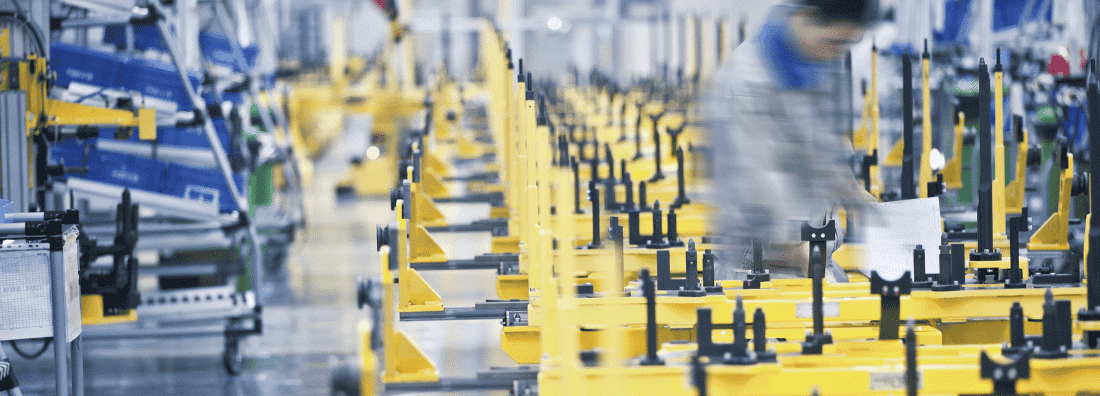The industrial internet of things (IIoT) is changing every facet of manufacturing. As factories automate data collection and communication, they create an interconnected network of machines and systems, opening up an information superhighway. IIoT makes a factory more efficient, and cost effective, with elements like predictive maintenance, lean manufacturing, and AI integration to raise manufacturing efficiency.
The technology behind IIoT links the physical processes with internal systems for full visibility of manufacturing operations. Integrated data enables more efficient collaboration and eliminates the traditionally time-consuming tasks of manufacturing when information was isolated to its own silo and humans had to facilitate communication. Now, the direct link between systems creates a smoother, faster workflow from pre-production to customer delivery with near-zero downtime. These perks of IIoT are adding value to the industry, said to be worth $205 billion by 2022, all thanks to the industrial IoT.
Despite the capabilities of smart factories, humans still play an integral role in the manufacturing industry. When production workers tap into the manufacturing digital workplace with a mobile communications app, they enhance operational efficiencies through:
- Real-time monitoring of the entire production line for any potential weak spots.
- Ability to remotely monitor equipment function and manufacturing operations.
- Making data-driven decisions based on IIoT communication.
Here’s how the IIoT makes manufacturing more efficient.
Automation Through AI: The IIoT Manufacturing That Never Sleeps
From robots building cars to sensors that monitor and eliminate emissions from gas turbines, AI is a big part of IIoT manufacturing. It’s the perfect solution for time-consuming processes once completed by production workers. There’s no risk of injury and no break times. AI can operate around the clock, creating algorithms based on its motion memory for higher volumes and faster output, shortens the production window, and delivers products faster. This positively impacts the customer experience and gives the manufacturer a competitive advantage.
Predictive Maintenance for Zero Factory Downtime
Equipment failure and malfunctions add up to 42% of the manufacturing industry’s unplanned downtime. Traditionally, a factory just scheduled maintenance for equipment based on date since the last inspection. The problem with this approach is that the maintenance might be premature and unnecessary, not to mention that the machine is offline during service and production is put on hold. If equipment fails in between scheduled maintenances, it stops production, leaving workers on the clock with nothing to do. It’s a costly breakdown that can run $260,000 an hour, but the good news is it’s avoidable in the factory of the future.
In the IIoT environment, sensors monitor the health of factory equipment through sound frequency, vibration, and temperature readings, and can alert plant operators for real-time maintenance when it’s actually needed. This protocol is known as predictive maintenance. This eliminates risk of disruption from equipment failures, allowing for an uninterrupted workflow. The increases equipment effectiveness by 89%, extends the life of the equipment, and avoids unforeseen breakdowns for a more efficient factory.
The Circular Economy and Lean Manufacturing
Part of what makes the IIoT the most efficient solution is its core value of extending the life of machines and materials. Many manufacturing operations have abandoned the traditional linear approach of “take-make-dispose” when it comes to production for the IIoT-enabled circular economy. Also known as lean manufacturing, this practice reduces waste in the manufacturing process. This can be achieved in a number of ways including:
- Powering a factory with renewable energy
- Using recycled materials to create new products
- Extending the lifecycle of factory equipment
- Product-as-a-service is a sharing concept (think Uber) on an on-demand basis. In manufacturing, factory equipment can be leased from an owner for a period of time, reducing purchase costs and goods consumption
The IIoT factory can monitor inventory to ensure the output matches the exact number of products ordered so no extra energy and material are wasted. It’s great for a manufacturing plant who will see substantial cost savings, but it’s great for their brand, and the planet.
In the manufacturing industry, efficiency from IIoT equates to higher revenues, better value proposition, better quality control, and a competitive edge from greater output for less money. Smart factories are the smart choice in lean manufacturing.







